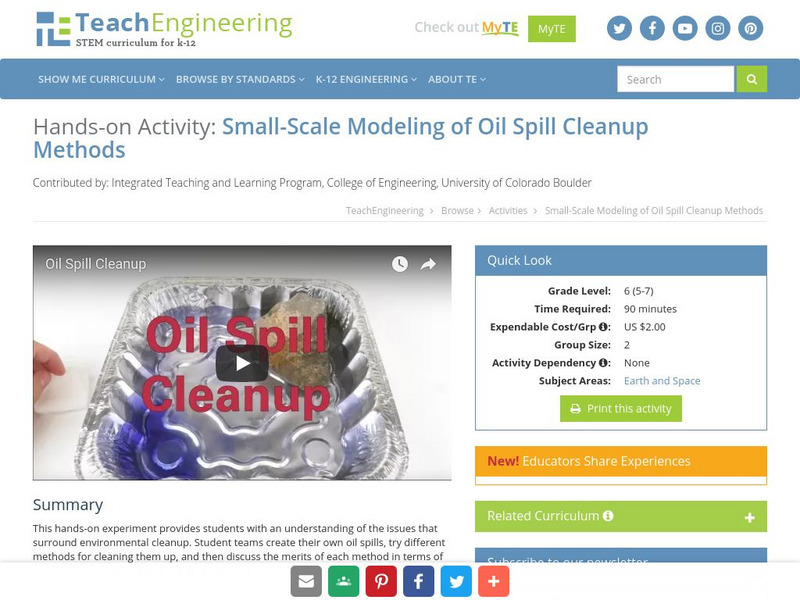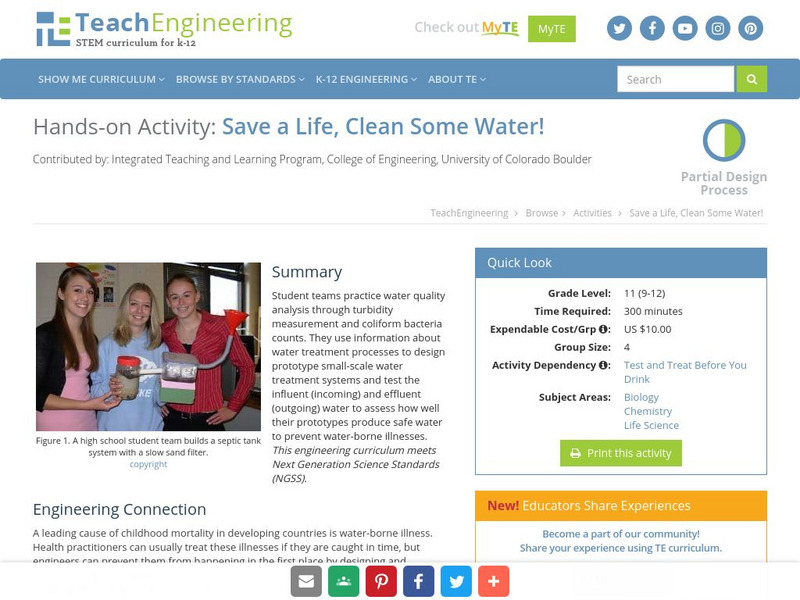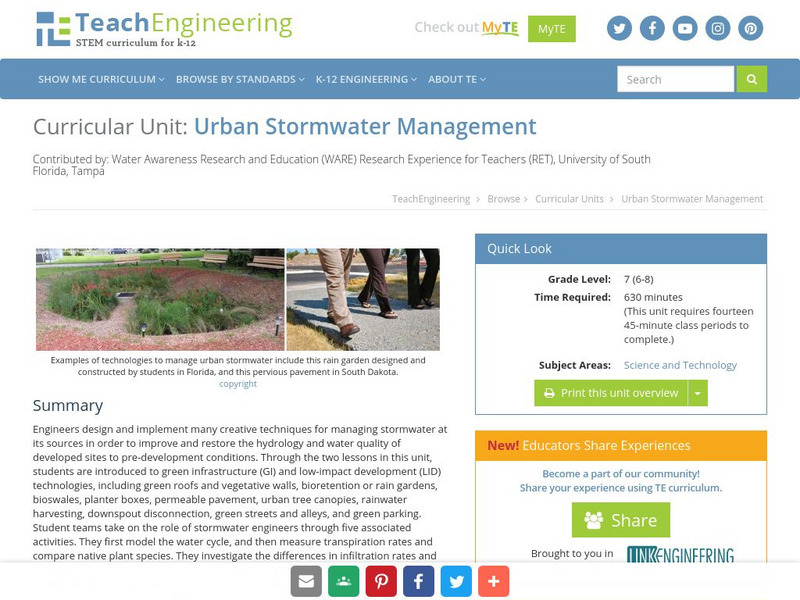PBS
Pbs News Hour: Water Recycling
PBS and the Online NewsHour have created this multimedia website about water recycling. You can see how this process is different than other waste water treatments by reading interviews, watching a slideshow or investigating a map of...
US Environmental Protection Agency
Epa: Water on Tap: What You Need to Know
Downloadable booklets with basic information about the U.S. water supply, e.g., where our drinking water comes from.
TeachEngineering
Teach Engineering: Oil Spill Cleanup
This hands-on experiment will provide students with an understanding of the issues that surround environmental cleanup. Students will create their own oil spill, try different methods for cleaning it up, and then discuss the merits of...
TeachEngineering
Teach Engineering: The Dirty Water Project
In this activity, students investigate different methods (aeration and filtering) for removing pollutants from water. They will design and build their own water filters.
TeachEngineering
Teach Engineering: Save a Life, Clean Some Water!
Student teams practice water quality analysis through turbidity measurement and coliform bacteria counts. They use information about water treatment processes to design prototype small-scale water treatment systems and test the influent...
TeachEngineering
Teach Engineering: Would You Drink That?
This activity focuses on getting students to think about bacteria, water quality and water treatment processes. Students develop and test their hypotheses about the "cleanliness" of three water samples prepared by the teacher. Then they...
TeachEngineering
Teach Engineering: Things That Matter to Flocculants
Prior to reaching households, water is exposed to a variety of treatments designed to render it fit for human consumption and use. One of the first treatment steps is the removal of suspended solids using chemical additives called...
TeachEngineering
Teach Engineering: Grow Your Own Algae!
Students discover how tiny microscopic plants can remove nutrients from polluted water. They also learn how to engineer a system to remove pollutants faster and faster by changing the environment for the algae.
TeachEngineering
Teach Engineering: Does Media Matter? Infiltration Rates and Storage Capacities
Students gain a basic understanding of the properties of media- soil, sand, compost, gravel- and how these materials affect the movement of water (infiltration/percolation) into and below the surface of the ground.
TeachEngineering
Teach Engineering: Urban Stormwater Management
Through the two lessons in this unit, students are introduced to green infrastructure and low-impact development technologies. Student teams take on the role of stormwater engineers through five associated activities.
TeachEngineering
Teach Engineering: Test and Treat Before You Drink
Students learn about water quality testing and basic water treatment processes and technology options. Biological, physical and chemical treatment processes are addressed, as well as physical and biological water quality testing,...
TeachEngineering
Teach Engineering: Flocculants: The First Step to Cleaner Water!
Students experience firsthand one of the most common water treatment types in the industry today, flocculants. They learn how the amount of suspended solids in water is measured using the basic properties of matter and light. In...
TeachEngineering
Teach Engineering: All About Water!
Students learn about the differences between types of water (surface and ground), as well as the differences between streams, rivers and lakes. Then, they learn about dissolved organic matter (DOM), and the role it plays in identifying...
Center for Innovation in Engineering and Science Education, Stevens Institute of Technology
Ciese Collaborative Projects: The Global Water Sampling Project
By testing your local water quality, you will be able to compare your results with students around the world. Register your class, and follow the project instructions. Additional teacher resources, references, and Ask-an-Expert sources...
Other
Safe Water Science: Lesson Downloads
A collection of downloadable, ready-to-use lessons and student worksheets aimed to raise awareness of the need for safe drinking water. Lessons are investigative in nature and utilize inexpensive materials that can be purchased at most...
US Environmental Protection Agency
Epa: The Water Sourcebooks [Pdf]
This is online resource is for teachers of all grades. The Water Sourcebook contains activities grouped according to grade level. Detailed lesson plans are provided along with glossary and fact sheets.
Arizona State University
Arizona State University: A Look Into the Water Treatment Process
Lesson explores water treatment process using techniques of coagulation, sedimentation, filtration, and disinfection.
American Institute of Biological Sciences
Action Bioscience: Seawater Desalination: Panacea or Hype?
An article and resources for research and teaching that explains how technologies are being used to desalinate ocean waters to be used for various municipal, industrial, and domestic purposes including a means to provide fresh water to...
Other
Njawwa: Kids' Water Zone
Students can learn fun facts about water, perform experiments with it, and play games about it. Includes links and a suggested reading list.
Other
Water Use It Wisely: Links and Resources for Water Conservation
A comprehensive reference page with numerous links to water conservation resources. On your quest to begin your own water preservation program, you can reach clean water organizations, read water conservation tips, research landscape...
TeachEngineering
Teach Engineering: Straining Out the Dirt
In this activity, students build a water filter with activated carbon, cotton and other materials to remove chocolate powder from water.
TeachEngineering
Teach Engineering: From Lake to Tap
In this activity, students will use a tutorial on the U.S. Environmental Protection Agency's website to learn about how surface water is treated to make it safe to drink.
TeachEngineering
Teach Engineering: Splish, Splash, I Was Takin' a Bath!
In this instructional activity, learners will explore the causes of water pollution and its effects on the environment through the use of models and scientific investigation. In the accompanying activities, they will investigate...
Other
Fnal: Supplying Our Water Needs
A cross-curricular lesson working out needs of a town where fish are dying in the local waters, how can water be purified, how daily activities impact the water supply, and what role does chemistry play in the way individuals use water...
















![Epa: The Water Sourcebooks [Pdf] Lesson Plan Epa: The Water Sourcebooks [Pdf] Lesson Plan](https://content.lessonplanet.com/knovation/original/438669-a5df3fb4e6ba6a238d3d8ad01b4a02a3.jpg?1661258064)





